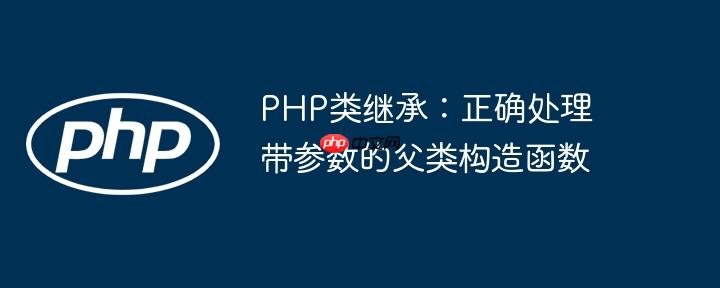
理解PHP中的构造函数与继承
在php中,构造函数(__construct())是类实例化时自动调用的特殊方法,用于执行对象的初始化操作。当一个类继承另一个类时(子类继承父类),子类可以选择定义自己的构造函数。
核心原则:
- 如果子类没有定义自己的构造函数,那么父类的构造函数将被隐式调用。
- 如果子类定义了构造函数,那么父类的构造函数将不会被隐式调用。在这种情况下,如果父类的初始化逻辑是必需的,子类必须显式地调用父类的构造函数。
常见问题:父类构造函数带参数时的调用错误
许多开发者在子类中定义构造函数时,忘记或错误地处理了父类构造函数所需的参数,导致运行时错误。
问题示例:
假设我们有一个父类DocumentProcessor,其构造函数需要一个参数,例如$documentTemplate用于初始化文档处理流程:
立即学习“PHP免费学习笔记(深入)”;
tempDocumentFilename = tempnam(Settings::getTempDir(), 'PhpWord');
if (false === $this->tempDocumentFilename) {
throw new CreateTemporaryFileException('Failed to create temporary file.');
}
// 模板文件克隆
if (false === copy($documentTemplate, $this->tempDocumentFilename)) {
throw new CopyFileException($documentTemplate, $this->tempDocumentFilename);
}
// 临时文档内容提取 (简化,仅为示例)
$this->zipClass = new ZipArchive();
$this->zipClass->open($this->tempDocumentFilename);
// ... 其他初始化逻辑 ...
echo "DocumentProcessor: 父类构造函数被调用,模板文件为:{$documentTemplate}\n";
}
// 假设这些方法存在于实际类中
protected function getHeaderName($index) { return 'header' . $index . '.xml'; }
protected function getFooterName($index) { return 'footer' . $index . '.xml'; }
protected function getMainPartName() { return 'document.xml'; }
protected function getSettingsPartName() { return 'settings.xml'; }
protected function getDocumentContentTypesName() { return '[Content_Types].xml'; }
protected function readPartWithRels($name) { return $this->zipClass->getFromName($name); }
}现在,我们创建一个子类MyCustomProcessor来扩展DocumentProcessor。如果子类构造函数像这样编写:
上述代码会导致一个TypeError,提示父类构造函数DocumentProcessor::__construct()期望一个参数,但实际传入了零个。这是因为当子类定义了构造函数时,它必须负责将父类构造函数所需的参数传递过去。
解决方案:正确传递参数给父类构造函数
解决这个问题的方法很简单:在子类的构造函数中,将父类构造函数所需的参数作为参数传递给parent::__construct()。
正确代码示例:
getMessage() . "\n"; }通过parent::__construct($documentTemplate);,子类将其构造函数接收到的$documentTemplate参数转发给了父类的构造函数,从而确保了父类能够正确地完成其初始化工作。
进一步考虑与最佳实践
参数一致性: 确保传递给parent::__construct()的参数与父类构造函数期望的参数类型、数量和顺序完全匹配。
子类特有参数: 如果子类构造函数需要额外的、父类不需要的参数,可以将其定义在子类构造函数中,并在调用parent::__construct()之后处理这些参数。
customSetting = $customSetting; echo "MyAdvancedProcessor: 子类构造函数被调用,自定义设置为:{$customSetting}\n"; } } try { $tempDoc = tempnam(sys_get_temp_dir(), 'test_doc_adv'); file_put_contents($tempDoc, 'Advanced test document.'); $advancedProcessor = new MyAdvancedProcessor($tempDoc, 'HighQuality'); echo "高级处理器实例化成功。\n"; unlink($tempDoc); } catch (Exception $e) { echo "高级处理器发生错误: " . $e->getMessage() . "\n"; }参数修改与传递: 在某些复杂场景下,子类可能需要对从外部接收到的参数进行预处理或转换,然后再将其传递给父类构造函数。
processedData = array_map('trim', $rawData); // 假设父类需要处理过的数据 echo "DataProcessor: 父类处理了数据。\n"; } } class CustomDataProcessor extends DataProcessor { public function __construct(string $inputString) { // 子类接收字符串,转换为数组后传递给父类 $dataArray = explode(',', $inputString); parent::__construct($dataArray); echo "CustomDataProcessor: 子类构造函数被调用。\n"; } } $processor = new CustomDataProcessor(" item1 , item2 ,item3 "); // 输出: // DataProcessor: 父类处理了数据。 // CustomDataProcessor: 子类构造函数被调用。总结
在PHP中进行类继承时,正确处理构造函数的调用是编写健壮、可维护代码的关键。当父类构造函数需要参数时,子类必须显式地通过parent::__construct()方法将这些参数传递给父类。遵循这一原则,可以确保父类的初始化逻辑得到正确执行,避免因参数缺失而导致的运行时错误,从而构建更可靠的面向对象系统。































